
Medicine Health Care and Philosophy
Scope & Guideline
Advancing Interdisciplinary Insights in Medicine and Philosophy
Introduction
Aims and Scopes
- Bioethics and Ethical Theory:
The journal focuses on various aspects of bioethics, exploring ethical theories in relation to medical practices, patient autonomy, and moral dilemmas in healthcare. - Philosophical Analysis of Health Concepts:
It emphasizes the philosophical analysis of key concepts such as disease, health, and well-being, offering insights into how these concepts are understood and applied in clinical contexts. - Interdisciplinary Approaches to Healthcare Issues:
The journal encourages interdisciplinary collaboration, integrating perspectives from philosophy, medicine, public health, and social sciences to address complex healthcare challenges. - Emerging Technologies and Ethical Implications:
A significant focus is placed on the ethical implications of emerging technologies in healthcare, including AI, genetic editing, and telemedicine, examining their impact on patient care and health equity. - Patient-Centered Care and Autonomy:
The journal examines the principles of patient-centered care and the importance of respecting patient autonomy in clinical decision-making, advocating for ethical practices that prioritize the patient's voice.
Trending and Emerging
- Ethics of Artificial Intelligence in Medicine:
There is a growing emphasis on the ethical implications of AI technologies in healthcare, including concerns about bias, accountability, and the impact on patient care. - Genetic Editing and Bioethics:
The journal is witnessing a surge in discussions surrounding genetic editing technologies, particularly in relation to ethical considerations of human enhancement, gene therapy, and the implications for identity and personhood. - Sustainability and Healthcare Ethics:
Emerging themes include the intersection of sustainability and healthcare ethics, addressing the ethical responsibilities of healthcare systems in the context of climate change and environmental justice. - Disability Studies and Healthcare:
There is an increasing focus on incorporating insights from disability studies into healthcare ethics, advocating for a more inclusive understanding of health and well-being. - Public Health Ethics in Crisis Situations:
The impact of recent global health crises, particularly COVID-19, has catalyzed discussions on public health ethics, emphasizing the need for ethical frameworks that guide decision-making in emergencies.
Declining or Waning
- Traditional Medical Ethics:
Discussions rooted in traditional medical ethics, such as the principles of beneficence, non-maleficence, and justice, are becoming less frequent, as the journal shifts towards more nuanced and context-sensitive ethical frameworks. - Historical Perspectives in Bioethics:
There seems to be a waning interest in purely historical analyses of bioethical issues, as contemporary challenges and future-oriented discussions take precedence over retrospective evaluations. - Generalized Discussions on Public Health:
Broad discussions on public health policies, without specific ethical implications, are less prevalent, indicating a shift towards more focused, ethically charged debates regarding public health interventions.
Similar Journals
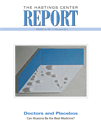
HASTINGS CENTER REPORT
Pioneering discussions on health ethics and philosophy.The HASTINGS CENTER REPORT, published by WILEY, is a leading journal in the fields of bioethics, health policy, and the philosophical underpinnings of healthcare. Established in 1971, this influential publication provides a critical platform for the discussion of ethical issues in health, medicine, and biotechnology, highlighting the intersection between ethical theory and practical health challenges. The journal achieves remarkable academic stature, achieving Q1 rankings in both Issues, Ethics and Legal Aspects and Philosophy, alongside Q2 standings in Health Policy and Health (social science) categories, reflecting its broad interdisciplinary impact. With its wide readership and rigorous peer-review process, the HASTINGS CENTER REPORT serves as an essential resource for researchers, practitioners, and students dedicated to advancing ethical perspectives in health-related discourse. While the journal operates under traditional access options, its contributions resonate deeply within the academic community, fostering informed dialogue on pressing ethical dilemmas and policy considerations in a rapidly evolving healthcare landscape.

HEALTH CARE ANALYSIS
Illuminating the intersection of ethics and policy.HEALTH CARE ANALYSIS, published by SPRINGER, is a distinguished journal that has been contributing to the field of Health Policy and related disciplines since its inception in 1993. With a significant focus on the intricate issues, ethics, and legal aspects surrounding healthcare, this journal holds a prominent status reflected in its Q2 rankings across various categories, including Health Policy, Health (social science), and Issues, Ethics and Legal Aspects. As of 2023, it ranks in the top quartiles of its respective fields, indicating robust scholarly engagement and impact within the academic community. Although the journal is not open access, it remains accessible to a wide audience through institutional subscriptions, making it an essential resource for researchers, healthcare professionals, and policy-makers seeking to advance their understanding of complex healthcare systems and ethical considerations. Positioned in the Netherlands, HEALTH CARE ANALYSIS continues to drive critical dialogue and research, ensuring its relevance in shaping future healthcare policies and practices.
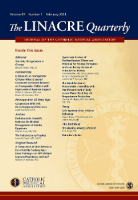
Linacre Quarterly
Illuminating the Philosophy Behind Health DecisionsLinacre Quarterly, published by SAGE Publications Inc, is a distinguished journal that serves as an interdisciplinary platform in the fields of Health Policy and Philosophy. With an ISSN of 0024-3639 and an E-ISSN of 2050-8549, this journal has been pivotal in providing insights into the intricate dynamics of health policy through a philosophical lens since its inception in 1945. Notably, it holds a respectable 2023 Scopus rank, placing it in the 68th percentile within the Arts and Humanities (Philosophy) category and the 21st percentile in Medicine (Health Policy). Though currently not offering Open Access options, Linacre Quarterly remains committed to advancing scholarly discussion and fostering innovation among researchers, professionals, and students alike. Located in the United Kingdom, this journal continues to uphold its reputation as a vital resource for those navigating the complexities of health-related ethical dilemmas and policy-making frameworks, thereby enhancing its visibility and relevance in academic discourse.

Teoria-Rivista di Filosofia
Cultivating Diverse Perspectives in Philosophical InquiryTeoria-Rivista di Filosofia is a distinguished academic journal published by EDIZIONI ETS, based in Pisa, Italy. With a focus on philosophical discourse, this journal is a valuable resource for researchers, professionals, and students in the field of philosophy. Having achieved a commendable Q3 ranking in the 2023 category quartiles, Teoria stands out in the competitive landscape of philosophy journals, with a Scopus rank of #612 out of 806, placing it in the 24th percentile. Although currently classified as a non-open access publication, it frequently addresses cutting-edge themes and challenges within philosophical research, promoting rigorous analysis and diverse perspectives. The journal spans various topics across multiple issues from its inception in 2011 to its ongoing publications scheduled through 2024, making it a relevant venue for contemporary philosophical inquiry. The journal aims to foster scholarly communication and stimulate critical debates, contributing significantly to the global philosophical landscape.

Christian Bioethics
Exploring the Intersection of Faith and EthicsChristian Bioethics is a pivotal journal published by Oxford University Press, dedicated to the interdisciplinary exploration of bioethical issues from a Christian perspective. Since its inception in 1995, the journal has served as a crucial platform for scholars, practitioners, and students to engage with complex ethical questions at the intersection of medicine, philosophy, and religious studies. With an evolving scope that reflects contemporary debates in bioethics, the journal has achieved notable rankings, including Q2 in Religious Studies and Q3 in Philosophy in 2023, underscoring its significance in these fields. While not open access, Christian Bioethics continues to bridge gaps between faith and science, encouraging rigorous dialogue on how Christian ethics can inform bioethical decision-making and policy. It is essential reading for those looking to deepen their understanding of ethical issues shaped by religious convictions, making it an invaluable resource for researchers and professionals alike.

Innere Medizin
Empowering Professionals with Cutting-Edge Medical Insights.Innere Medizin, published by SPRINGER MEDIZIN VERLAG GmBH, is a prominent journal based in Germany, dedicated to advancing the field of internal medicine. With its ISSN 2731-7080 and E-ISSN 2731-7099, the journal serves as a vital platform for researchers, clinicians, and students focusing on the latest advancements, research developments, and clinical practices in internal medicine. Although categorized in the Q4 quartile for 2023, it is positioned to provide rich content that addresses diverse issues within the field, from chronic illnesses to innovative treatment methodologies. Though currently not an open-access journal, Innere Medizin emphasizes the importance of accessibility in medical research, contributing to impactful discourse within the community. In the competitive landscape of medical publications, it aims to support scholarly communication and enhance knowledge sharing among professionals, making it a significant resource for anyone interested in internal medicine.
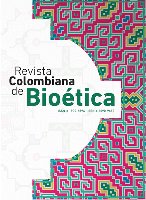
Revista Colombiana de Bioetica
Democratizing Knowledge in the Field of BioethicsRevista Colombiana de Bioetica, an esteemed publication under the auspices of UNIV EL BOSQUE, serves as a pivotal platform in the interdisciplinary field of bioethics, offering insights and scholarly discourse relevant to researchers, professionals, and students alike. With an ISSN of 1900-6896 and an E-ISSN of 2590-9452, this open access journal, available since 2010, champions the democratization of knowledge, ensuring that vital research is accessible to all. Nestled in Bogotá, Colombia, the journal's commitment to ethical inquiry and critical thinking in biomedical and health-related disciplines positions it as a crucial resource for those keen on exploring the intersections of ethics, law, philosophy, and health sciences. By facilitating the exchange of innovative ideas and research, the Revista Colombiana de Bioetica aspires to inspire informed dialogue and foster ethical practices within the scientific community and beyond.
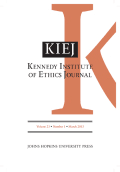
KENNEDY INSTITUTE OF ETHICS JOURNAL
Exploring Ethical Frontiers in Health Policy and PhilosophyThe KENNEDY INSTITUTE OF ETHICS JOURNAL, published by the prestigious Johns Hopkins University Press, stands as a leading periodical in the realm of ethics, particularly emphasizing the intersection of health policy, social sciences, history, and philosophy of science. With an ISSN of 1054-6863 and an E-ISSN of 1086-3249, this journal has been a cornerstone of ethical discourse since its inception in 1991. Renowned for its rigorous peer-review process, the journal boasts impressive rankings, including Q1 in History and Philosophy of Science and Q2 in Health (Social Science) for 2023. Researchers, professionals, and students alike will find this journal invaluable for navigating complex ethical issues, providing a platform for innovative research and discourse. Although currently not offering Open Access, its contributions to the fields of ethics and legal aspects of health are profound, making it an essential resource for those engaged in these critical discussions.

HEC Forum
Exploring the Intersection of Healthcare and Legal FrameworksHEC Forum, an esteemed journal published by Springer, is dedicated to advancing the field of health policy and ethics, bridging critical gaps between healthcare practices and legal frameworks. With the ISSN 0956-2737 and the E-ISSN 1572-8498, this journal has been a pivotal platform since its inception in 1989, collaborating with scholars and practitioners up to the year 2024. Recognized within the Q3 quartile of several categories—including Health Policy and Issues, Ethics and Legal Aspects—HEC Forum holds a significant position in scholarly circles, showcasing rigorous research and discussions relevant to today’s health care challenges. The journal's Scopus rankings highlight its impact, positioned favorably in the realms of Nursing and Health Policy. Although it does not offer open access, HEC Forum remains a critical resource for researchers, professionals, and students seeking to deepen their understanding of health ethics and policy implications in a rapidly evolving landscape.
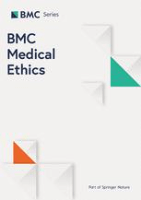
BMC Medical Ethics
Shaping the future of medical ethics through open dialogue.BMC Medical Ethics is a leading open-access journal dedicated to the critical exploration and dissemination of knowledge surrounding ethical issues in healthcare and medicine. Published by BMC, and headquartered in the United Kingdom, this journal has become a cornerstone in the field since its inception in 2000, with a remarkable focus on health policy, nursing ethics, and the complex legal aspects intertwining with healthcare practices. With an impressive Q1 ranking across multiple categories, including Health Policy and Health (Social Science), it ranks among the top journals globally—particularly notable with its Scopus rankings reflecting a strong 85th percentile in Nursing and an 81st percentile in Social Sciences. As an open-access publication, BMC Medical Ethics ensures that research findings are readily accessible, fostering a collaborative environment for researchers, practitioners, and students alike. The journal's commitment to ethical discourse not only advances academic inquiry but also shapes the practices and policies that govern healthcare delivery; thus, making it an invaluable resource for those engaged in the advancement of medical ethics.